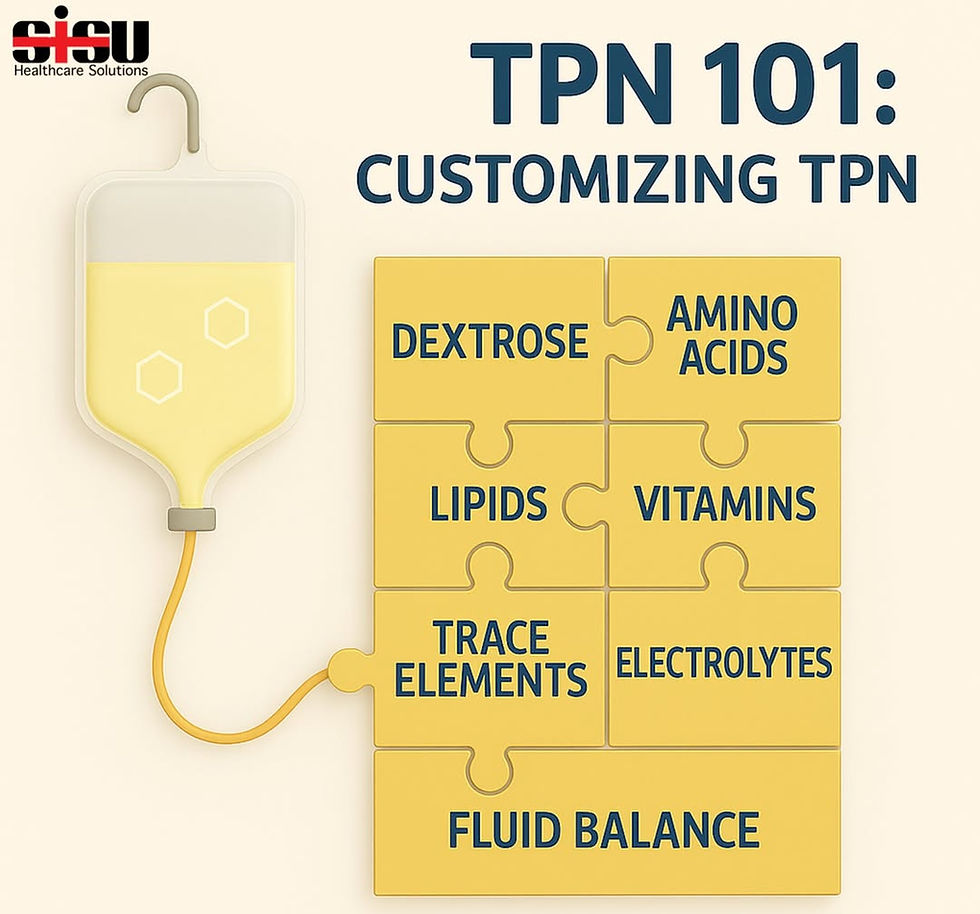Immune Globulin Intravenous (IVIG)
- CKHendry
- Jul 14, 2023
- 5 min read
As a leader in infusion therapy and nutrition services, we understand the commitment and care coordination that is required to achieve the best possible outcomes for patients receiving at-home IVIG therapy.
What is IVIG?
Immune Globulin Intravenous (IVIG), also known as Intravenous Immunoglobulin, is a medication made from donated blood plasma. It contains a high concentration of antibodies that are derived from the plasma of healthy individuals. IVIG is administered intravenously, meaning it is injected directly into a vein.
IVIG is used for several therapeutic purposes, primarily to boost the immune system and provide passive immunity. Here are some key points about IVIG:
Antibody Replacement: IVIG is used to supplement or replace deficient or dysfunctional antibodies in individuals with primary immunodeficiency disorders. These disorders are characterized by a weakened immune system, making individuals more susceptible to infections. IVIG provides a temporary boost to the immune system by introducing a wide range of antibodies to help fight off infections.
Immunomodulation: IVIG can also modulate the immune system by affecting various components of the immune response. It has anti-inflammatory properties and can regulate the immune system's activity, making it useful in the treatment of certain autoimmune and inflammatory conditions, such as Guillain-Barré syndrome, Kawasaki disease, and certain types of arthritis.
Preventing Infections: IVIG is sometimes given as a preventive measure in individuals with weakened immune systems or those at high risk of developing severe infections. It can help reduce the frequency and severity of infections in these individuals.
Other Uses: IVIG has been used off-label for various conditions, including certain neurological disorders like chronic inflammatory demyelinating polyneuropathy (CIDP) and multifocal motor neuropathy (MMN), as well as certain dermatological conditions like dermatomyositis and pemphigus vulgaris.
Administration: IVIG is typically administered in a hospital or clinic setting by healthcare professionals. The dose and frequency of IVIG treatment vary depending on the condition being treated, the individual's weight, and other factors. The infusion process can take several hours, and patients are usually monitored closely during and after the infusion for any potential adverse reactions.
Side Effects: IVIG is generally considered safe, but like any medication, it can cause side effects in some individuals. Common side effects include headache, fever, chills, nausea, muscle or joint pain, and fatigue. Serious side effects are rare but can include allergic reactions, kidney problems, and blood clotting issues.
It's important to note that IVIG should only be used under the guidance of a healthcare professional who can assess its suitability and monitor its effectiveness and safety in each individual case.
IVIG is used to treat various medical conditions, including:
1. Primary Immunodeficiency Disorders: IVIG is commonly used to treat individuals with primary immunodeficiency disorders, such as common variable immunodeficiency (CVID), X-linked agammaglobulinemia (XLA), and selective IgA deficiency. These conditions result in a weakened immune system, making individuals more susceptible to infections. IVIG helps replace or supplement the deficient or dysfunctional antibodies, providing temporary immunity.
2. Autoimmune and Inflammatory Disorders: IVIG can be used as an immunomodulatory therapy for certain autoimmune and inflammatory conditions. Some examples include:
- Guillain-Barré syndrome (GBS): IVIG is often administered as a first-line treatment for GBS, a neurological disorder where the immune system mistakenly attacks the peripheral nerves.
- Kawasaki disease: IVIG is a key component of the treatment for Kawasaki disease, a childhood condition that causes inflammation in the blood vessels.
- Rheumatoid arthritis: IVIG may be used as an adjunctive therapy for individuals with severe rheumatoid arthritis who do not respond adequately to other treatments.
- Dermatomyositis and polymyositis: These are inflammatory muscle diseases that may be treated with IVIG in some cases.
- Systemic lupus erythematosus (SLE): IVIG can be considered as a treatment option for certain manifestations of SLE, although it is not commonly used.
3. Neurological Disorders: IVIG is sometimes used in the treatment of certain neurological disorders, including:
- Chronic inflammatory demyelinating polyneuropathy (CIDP): IVIG is a first-line treatment for CIDP, a chronic autoimmune disorder affecting the peripheral nerves.
- Multifocal motor neuropathy (MMN): IVIG is often used to manage MMN, a rare nerve disorder characterized by muscle weakness and atrophy.
- Myasthenia gravis: IVIG can be employed as a short-term treatment for exacerbations in myasthenia gravis, a neuromuscular disorder characterized by muscle weakness.
- Stiff person syndrome: IVIG may be considered in the treatment of stiff person syndrome, a rare neurological condition causing muscle stiffness and spasms.
These are just a few examples of the conditions for which IVIG may be used. It's important to note that the decision to use IVIG and the specific dosage and treatment duration are determined by healthcare professionals based on the individual's condition, medical history, and response to treatment.
Before receiving IVIG treatment, patients should follow certain preparations to ensure a safe and effective infusion. Here are some general guidelines for patients preparing for IVIG:
1. Medical Evaluation: Patients should undergo a thorough medical evaluation by their healthcare provider. This includes reviewing their medical history, current medications, and any known allergies. The healthcare provider will assess the patient's specific condition and determine if IVIG is an appropriate treatment option.
2. Consent and Education: Patients should receive proper education about IVIG treatment, including its purpose, benefits, potential risks, and side effects. They should have a clear understanding of the procedure, infusion process, and any precautions or instructions provided by their healthcare provider. Patients should provide informed consent before proceeding with IVIG.
3. Pre-Medication: In some cases, patients may need pre-medication before the IVIG infusion. This can include medications such as antihistamines or acetaminophen to reduce the risk of potential infusion-related reactions. The specific pre-medication regimen, if necessary, will be determined by the healthcare provider.
4. Hydration: Adequate hydration is important before the IVIG infusion. Patients should drink plenty of fluids in the days leading up to the treatment, as it can help improve vein access and reduce the risk of complications during the infusion.
5. Lifestyle Adjustments: Patients may be advised to make certain lifestyle adjustments before IVIG treatment. This can include avoiding strenuous physical activities, getting adequate rest, and maintaining a balanced diet to support overall health and immune system function.
6. Fasting: In most cases, IVIG does not require fasting. However, some specific circumstances or concurrent treatments may require fasting. Patients should follow any fasting instructions provided by their healthcare provider if applicable.
7. Communication: Patients should inform their healthcare provider about any changes in their health status or if they develop any new symptoms before the scheduled IVIG infusion. This includes any signs of infection, fever, or respiratory symptoms.
8. Transportation and Support: IVIG infusions can take several hours, so patients may need to arrange transportation to and from the treatment facility. It may also be helpful to have a family member or friend accompany them during the infusion for support.
9. Clothing: Patients should wear loose, comfortable clothing on the day of the infusion, as it allows easy access to the veins for the IV line insertion.
It is important to note that these preparations may vary depending on the specific requirements of each patient and the treatment facility. Patients should follow the instructions provided by their healthcare provider and seek clarification on any concerns or questions they may have.




Comments